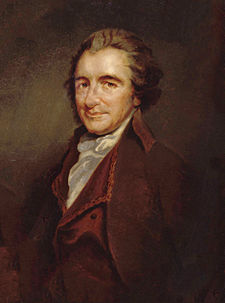This Week in History
December 23-29, 1776:
"These Are the Times That Try Men's Souls"
December 2012
 Thomas Paine, oil painting by Auguste Millière.
|
It was late December 1776, when, in the midst of the dismal full retreat from New York forced upon the Continental Army, a clarion call was raised in the form of a small pamphlet called The American Crisis. The author, who had travelled with General Washington's army, was young Thomas Paine, the author of the widely circulated, and wildly popular, pamphlet Common Sense. Paine, who had been sent to Philadelphia through the mediation of the American Revolution's key recruiter, Benjamin Franklin, in 1774, was already famous for his pro-independence pamphlet, which had begun circulating in January 1776.
Now, however, with the cause of the Americans seemingly in trouble, Paine undertook to write a series of Crisis papers, as a means of rallying the army and population as well. Ultimately there were 16 papers, spanning the period through 1783.
While the paper is too long to be reproduced here in full, we quote some substantial sections, to remind Americans, and others, of Paine's overarching polemic: that it would take the dedication and action of all, in order to prevent tyranny from achieving victory, and that those who fight when the situation seems most desperate, deserve the accolades of future generations. The threat which the abandonment of the American intellectual tradition has now brought to the very existence of the United States and humanity, is no less great today, and the challenge to personal commitment, a matter of equal urgency.
"These are the times that try men's souls. The summer soldier and the sunshine patriot will, in this crisis, shrink from the service of their country; but he that stands it now, deserves the love and thanks of man and woman. Tyranny, like hell, is not easily conquered; yet we have this consolation with us, that the harder the conflict, the more glorious the triumph. What we obtain too cheap, we esteem too lightly: it is dearness only that gives every thing its value. Heaven knows how to put the proper price upon its goods; and it would be strange indeed if so celestial an article as freedom should not be highly rated. Britain, with an army to enforce her tyranny, has declared that she has a right, not only to tax, but 'to bind us in all cases whatsoever', and if being bound in that manner, is not slavery, then there is not such a thing as slavery upon earth. Even the expression is impious; for so unlimited a power can belong only to God....
"...I turn with the warm ardour of a friend to those who have nobly stood, and are yet determined to stand the matter out: I call not upon a few, but upon all: not on this state or that state, but on every state: up and help us; lay your shoulders to the wheel; better have too much force than too little, when so great an object is at stake. Let it be told to the future world, that in the depth of winter, when nothing but hope and virtue could survive, that the city and the country, alarmed at one common danger, came forth to meet and to repulse it. Say not that thousands are gone, turn out your tens of thousands; throw not the burden of the day upon Providence, but 'show your faith by your work,' that God may bless you. It matters not where you live, or what rank of life you hold, the evil or the blessing will reach you all. The far and the near, the home counties and the back, the rich and the poor, will suffer or rejoice alike. The heart that feels not now is dead; the blood of his children will curse his cowardice, who shrinks back at a time when the little might have saved the whole, and made them happy. I love the man that can smile in trouble, that can gather strength from distress, and grow brave by reflection. 'Tis the business of little minds to shrink; but he whose heart is firm, and whose conscience approves his conduct, will pursue his principles unto death....
"...Once more we are again collected and collecting; our new army at both ends of the continent is recruiting fast, and we shall be able to open the next campaign with sixty thousands men, well armed and clothed. This is our situation, and who will may know it. By perseverance and fortitude we have the prospect of a glorious issue; by cowardice and submission, the sad choice of a variety of evils—a ravaged country—a depopulated city—habitations without safety, and slavery without hope—our homes turned into barracks and bawdy-houses for Hessians, and a future race to provide for, whose fathers we shall doubt of. Look on this picture and weep over it! and if there yet remains one thoughtless wretch who believes it not, let him suffer it unlamented."
The original article was published in the EIR Online’s Electronic Intelligence Weekly, as part of an ongoing series on history, with a special emphasis on American history. We are reprinting and updating these articles now to assist our readers in understanding of the American System of Economy.
